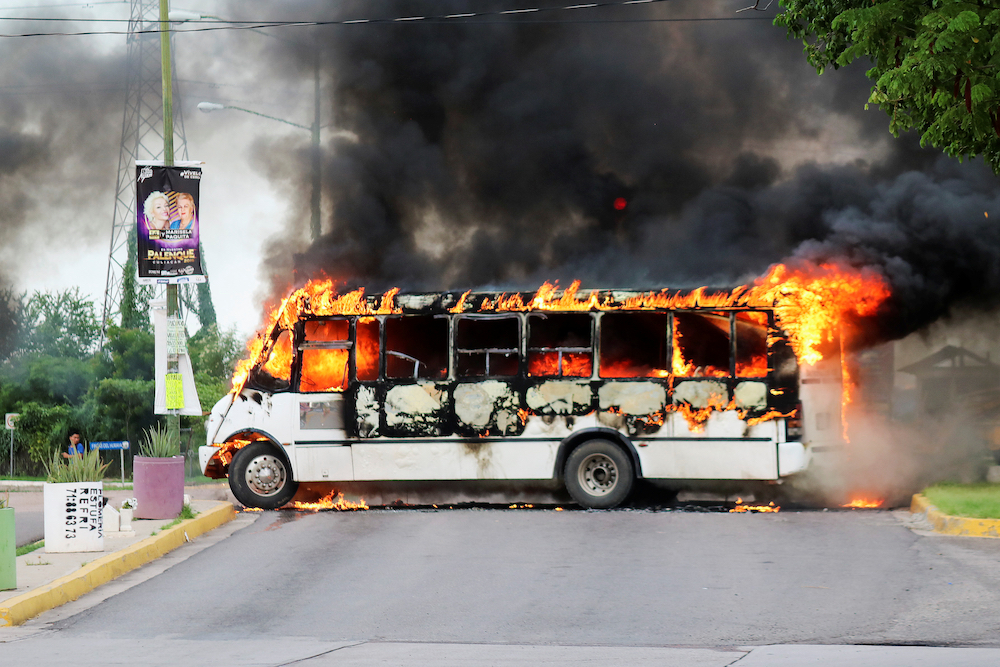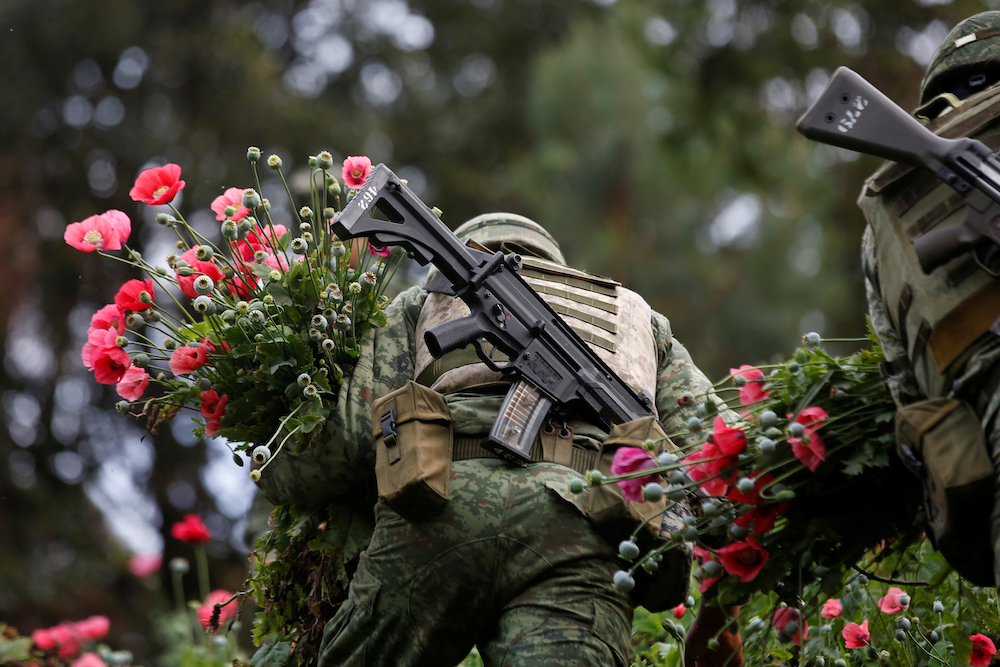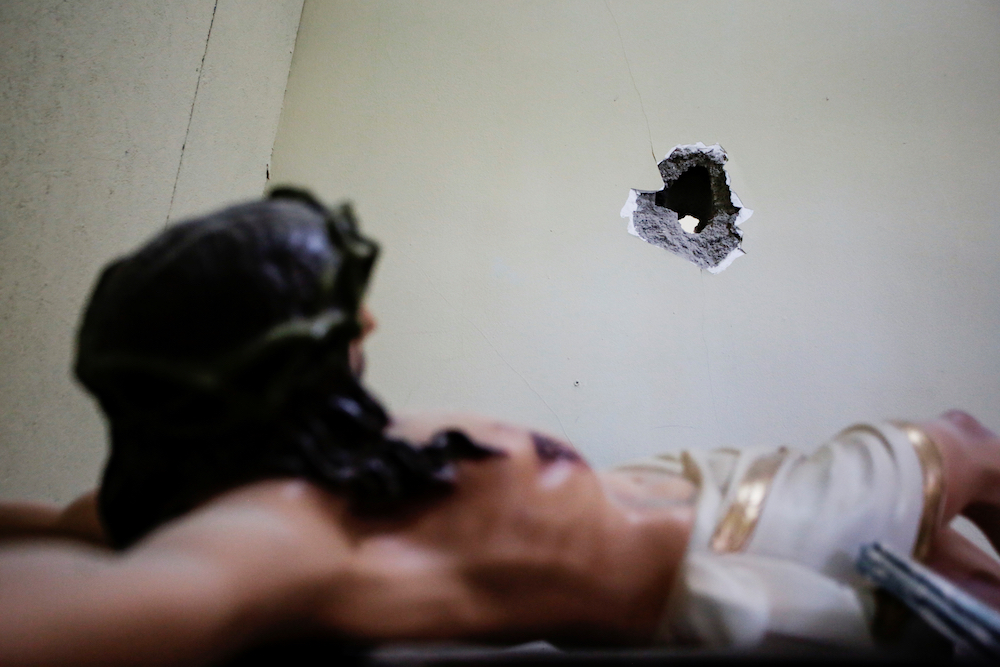
A drug cartel in Culiacan, Mexico, burned a bus Oct. 18, 2019, during a clash with national security forces following the detention of Ovidio Guzman, son of drug kingpin Joaquin "El Chapo" Guzman. (CNS/Reuters/Jesus Bustamante)
Pietro Ameglio Patella thinks the phrase "drug war" does not accurately describe the conflict in Mexico. "What really is happening in Mexico is a trans-national, inter-capitalist war for the monopoly over an illegal commodity and other crimes," he said. He shared this message with audiences at the College of the Holy Cross and Worcester State University during his visit here Oct. 28-30, 2019.
That war has killed tens of thousands of Mexicans and infiltrated the country with criminality. Yet even in these difficult circumstances, ordinary people are engaged in movements to reclaim Mexico's ethical boundaries and build peace, Ameglio said.
An internationally recognized nonviolent strategist, Ameglio is a professor of peace and nonviolence culture at Mexico City's National Autonomous University (UNAM), the largest university in Latin America. He writes often about nonviolent initiatives in Mexico, a country he once described as "riddled by acts of war."
Former Mexican President Felipe Calderón first declared war on Mexico's drug trade in December 2006, deploying the military to combat cartels. The policy has proved to be catastrophic for Mexico. The cartels expanded, and the war, now in its second decade, has resulted in at least 150,000 homicides, with the tally still rising. According to government records, more than 61,000 Mexicans are missing or disappeared. (Victim advocate groups estimate 100,000 or higher. By comparison, some 40,000 people "disappeared" during the 1960-1996 civil war in Guatemala, 10,000 to 30,000 during the 1976-1983 "dirty war" in Argentina.)
The violence has severely corrupted state functions, Ameglio told his Worcester audiences. All the cartels include business people, members of the police, military and paramilitaries, as well as local, state, and federal government officials, he said. He cited a 2011 study done by UNAM that found organized crime directly employs 600,000 people and is one of Mexico's biggest employers. The person who works as a municipal bureaucrat by day might also drive for the cartels at night, Ameglio said. "So if you go to report something, you don’t know who you are dealing with."
Ordinary Mexicans are pushing back. In early 2019, Ameglio joined volunteers with the fourth National Search Brigade as they looked for the disappeared in Guerrero, an impoverished state known for its tourist attractions, poppy production, and ghoulish violence. From Jan. 18 to Feb. 2 last year, the brigade combed hillsides and desert scrub searching for human remains.
Advertisement
About 180 people from 18 states participated, making the fourth National Search Brigade the largest one organized so far by Enlace Nacionales (National Links), a coalition of grassroots organizations founded by María Herrera, mother of four disappeared sons. During the two-week event, searchers found seven bodies and more than 60 other bones, Ameglio said.
Participants included human rights and peace activists, academics, members of faith communities, forensic specialists, trauma counselors and family members of the disappeared, who are the instigators of a movement calling for a public reckoning with the war's devastation.
" … scouring the earth with exemplary valor, firmness and dignity, they have constructed one of the most radical resistance actions against this war of massive and selective extermination in Mexico," wrote Ameglio in an essay last February about the fourth National Search Brigade published in Des Informémonos.
Mexican officials have acknowledged more than 3,000 secret burial sites across the country, according to The Guardian. A total of 522 were identified just this past year. The data is notoriously incomplete due to years of government inaction addressing the crisis of the disappeared and only gives a partial picture of its severity.
Citizens' brigades continue to find new sites. Mexico News Daily reported that the Searching Mothers of Sonora located 52 bodies last fall in the northern state.
"Mexico is one great clandestine graveyard," said Undersecretary of Human Rights for the Interior Ministry Alejandro Encinas, who participated in the fourth National Search Brigade. "The forced disappearance, either by agents of the state of by individuals is one of the most debilitating problems that our society is experiencing."

Mexican soldiers in Pueblo Viejo, Mexico, cut an illegal field of opium poppies Aug. 25, 2019.(CNS/Reuters/Carlos Jasso)
"Disappearing a person is a very sophisticated way of building terror in the social fabric," Ameglio said. The tactic, used during the Nazi Party's rule in Germany, the Algerian War of Independence, and Latin America's "dirty wars," leaves families and communities in perpetual anguish. "To bury a body gives peace," Ameglio said. But if your loved one disappeared, "you are always looking in the street, in the park. You enter into a way of not living."
Ameglio estimates there are more than 60 brigades scouring for human remains throughout Mexico. Their national network is growing, he said. "They represent an expression of nonviolent non-cooperation. They do what the state doesn't do, and they do it without asking permission. Sometimes we must act without permission."
"Some 70 percent of those who dedicate their lives to organizing, searching and advocating for disappeared loved ones are women," wrote Laura Carlsen, director of the Americas Program of the Center for International Policy, in an essay about the fourth National Search Brigade.
There is no single explanation for why so many Mexicans have gone missing during the drug war. Or what happened to them. What many disappearances share in common are government inaction or a refusal to investigate evidence linking soldiers or the police to the crime says a 2013 Human Rights Watch report on Mexico's disappeared.

A bullet hole in the town hall of Villa Union, Mexico, is seen near a sculpture of Jesus Dec. 2, 2019. To the south, the Diocese of Cuernavaca has suspended evening Masses due to insecurity in the city and surrounding state of Morelos, a reflection of the violence raging in parts of Mexico and its impact on the Catholic Church. (CNS/Reuters/Daniel Becerril)
On Sept. 26, 2014, 43 male students from a rural teachers' college were abducted near Iguala, Guerrero, while en route to a protest. An official probe concluded corrupt municipal police officers colluded with a local cartel in committing the crime. The report, however, was widely discredited and many Mexicans allege a government cover-up involving drugs. Last September, Mexico's attorney general announced a re-investigation of the case "from scratch." Meanwhile, the missing students have yet to be found.
For years, the Calderón government claimed the disappeared were criminals killed during turf battles between the cartels. Families seeking the whereabouts of their loved ones often searched in isolation and at their own risk. Their invisibility decreased after the March 2011 torture and killing of seven young men in Cuernavaca, the city where Ameglio lives. Among the murdered was the son of Javier Sicilia, an award-winning Mexican poet whom Time magazine described as "a left leaning spiritual Roman Catholic."
"We've had it up to here," wrote Sicilia in 2011 in a scathing open letter to politicians, the judiciary and criminals, saying that because of the failed state, "every citizen in this country has been reduced to what philosopher Giorgio Agamben has called, using a Greek word, zoe: that is unprotected life, the life of an animal, of a being that can be subjected to violence, kidnapped, ill-treated or humiliated and murdered with impunity."
Sicilia's letter ignited Movement for Peace and Justice with Dignity (MPJD), which Ameglio, a close friend of the poet, helped organize. Tens of thousands of Mexicans took to the streets in protest of the war's brutality. Sicilia publicly called for the resignation of Genaro García Luna, then the Secretary of Public Security.
A large and diverse array of civil society organizations, indigenous groups, and individual victims signed the National Pact for Peace. MPJD organized a "Caravan of Solace," one of several caravans of activists and victim family members who journeyed through Mexico and the U.S. giving testimonies about the human toll of Mexico's drug war and the plight of migrants. There were sit-ins at a state's attorney general's office and meetings with the federal government including an unprecedented public session between family members of victims and President Calderón and his wife.
MPJD was "one of the greatest experiences and mass mobilizations that have taken place in Latin America in recent years," wrote Ameglio in a chapter for El Movimiento por la Paz con Justicia y Dignidad, a book about the MPJD edited by Sicilia and Eduardo Vazquez. While the movement achieved little in terms of policy change, it succeeded in exposing the "horror and magnitude of the war" and in dignifying and empowering the victims.
Today, MPJD exists in name only. The search brigades, comprised primarily of family members of victims are its practical legacy. Through collective action, the families of the disappeared have evolved from "being desperate persons to being social activists and human rights defenders. They don't just look for their loved ones. They search for everyone who can be in the area," Ameglio said.
Ameglio said many brigades had formed an "alliance of empathy," with the brigades of Central Americans, also mostly women, who periodically come into Mexico looking for missing children, many of whom are imprisoned, trapped in work camps, or prostitution. Unlike the Mexican searchers, the Central Americans usually find their loved ones alive.
In 2017, the Mexican bishops conference issued a call for action on the thousands of cases of the missing. The National Search Commission was established in 2018, and Mexican president Andrés Manuel López Obrador has promised to spare no cost in locating and identifying the disappeared.
Obstacles for the searchers, however, persist. López Obrador, who campaigned on a pledge to end the drug war, is facing pushback from the cartels, Ameglio said. Violence has spiked in Mexico. U.S. President Donald Trump's insistence Mexico secure its borders has forced the Mexican leader to divert the National Guard to Mexico's northern and southern borders, leaving other unstable regions without federal protection. Searchers often look for a loved one under the watchful and ominous eye of local gangs.
Ameglio thinks the brigades need to continue to strengthen and expand their network. They are in a "new phase" and need forensic assistance identifying the bodies and bones recovered. While he lauded "grassroots nuns and priests," for their support, he criticized the Catholic hierarchy for its inaction. More than statements and declarations are needed, he believes.
"This is a real moral issue. It is critical that we not leave the families and their organizations on their own," Ameglio wrote in his essay on the search brigades. He urged churches and other institutions with moral authority to assist in the "next-to-impossible" task of locating bodies.
[Claire Schaeffer-Duffy, a freelance writer, lives and works at the Sts. Francis and Therese Catholic Worker Community in Worcester, Massachusetts. She and her husband, Scott, co-founded the community in 1987. She has been contributing to NCR since 1999.]





